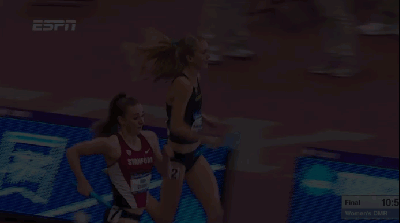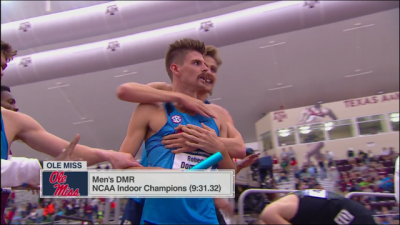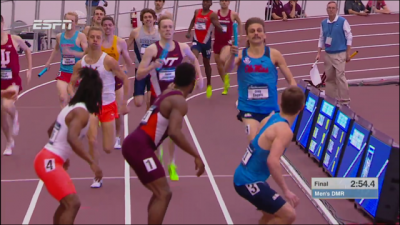DMR Madness: Colorado Goes From 9th to First to Win Women’s DMR, Ole Miss Gets Title #1 a Little More Easily
by LetsRun.com
March 10, 2017
COLLEGE STATION, Texas — Prior to the meet, the Oregon Ducks, with a record-setting women’s team and Edward Cheserek as a possible men’s anchor, looked poised to become the first school since Michigan in 2005 to sweep the distance medley relays at the NCAA Indoor Championships.
Instead, after resting Raevyn Rogers in the women’s race and resting Cheserek in the men’s, we saw a pair of first-time winners. In the men’s race, Ole Miss anchor Robert Domanic powered away from the field as the Rebels won handily in the end in 9:31.32, over two seconds ahead of runners-up Virginia Tech. The women’s race came right down to the wire, with Oregon, Stanford and Colorado engaging in an epic three-way kick on the home straight. In the end, it was the Buffaloes and anchor Dani Jones — who came back from ninth place with two laps to go — who prevailed, as Jones outleaned Stanford’s Elise Cranny to win by .02 in 11:00.34.
We recap both below, starting with the thrilling women’s race.
Women’s DMR: Who says Colorado isn’t a track school?
During Mark Wetmore’s tenure, the University of Colorado has been known as a cross country program first and foremost. But tonight’s DMR will be talked about for a long time in Boulder as it was truly epic.
Normally it’s the men’s DMR at NCAA that goes tactical, but tonight it was the women’s turn as through three legs, eight teams were within three seconds of the lead. Amazingly, Colorado wasn’t one of them, but none of the eight schools ahead of them — Michigan, Indiana, Oregon, BYU, Stanford, Penn State, Kansas and LSU — elected to push the pace on the anchor leg. That allowed Jones to slowly reel in the leaders, and she eventually latched on to the back of the pack with just under 600 meters to go. But Jones still had a lot of work to do; with two laps to go, there were still eight teams in front of her.
At that point, the teams were bunched up and that led to tragedy for Indiana. Just after passing two to go, the Hoosiers’ Katherine Receveur was perfectly positioned to strike in second, but Cranny tried to cut in and pass. She contacted Receveur, who dropped the baton as a result, leading to contact between several teams. Thankfully, no one else was seriously affected, and the slow pace allowed the remaining eight teams to stay in contact.
Jones took advantage, moving from eighth to fifth on the backstretch of the penultimate lap. Finally, just as the teams approached the bell lap, Oregon’s Katie Rainsberger made a hard move. Cranny followed; Jones also upped her pace but was still a few meters down after having to pass Michigan anchor Gina Sereno on the first turn.
With 100 to go, it was setting up as a great battle between Rainsberger and Cranny with Cranny on Rainsberger’s shoulder; ironically, both are Colorado natives who spurned their home-state school. Cranny looked to have timed her move perfectly, passing Rainsberger off the final turn with nothing but open track in front of her. But she had forgotten about Jones, who had been about four meters down entering the final turn, and as Cranny swung out to lane 2 to pass Rainsberger, Jones was in lane 3 lining up a kick of her own. She ran Cranny down and the two crossed the line almost simultaneously; Jones’ first action after finishing was not to celebrate, but to turn toward the scoreboard and wait for the result. A few seconds later, Colorado popped up as No. 1, and Jones congratulated Rainsberger and Cranny before finding teammates Tabor Scholl, Elissa Mann and Sage Hurta trackside to celebrate a famous win.
Colorado had won by a hair, 11:00.34 to 11:00.36, with Oregon — who led on the final turn — having to settle for third.
Gif of Finish
| Team | Time | |||
|---|---|---|---|---|
| 1 | COLORADO | Colorado | 11:00.34 | |
| 2 | STANFORD | Stanford | 11:00.36 | |
| 3 | OREGON | Oregon | 11:00.68 | |
| 4 | BYU | BYU | 11:03.42 | |
| 5 | MICHIGAN | Michigan | 11:04.74 | |
| 6 | PENN STATE | Penn State | 11:04.89 | |
| 7 | KANSAS | Kansas | 11:05.35 | |
| 8 | NOTRE DAME | Notre Dame | 11:05.76 | |
| 9 | INDIANA | Indiana | 11:06.03 | |
| 10 | LSU | LSU | 11:06.83 | |
| 11 | ARKANSAS | Arkansas | 11:10.41 | |
| 12 | VILLANOVA | Villanova | 11:13.59 |
Jones got the baton in ninth, but the fact that she was even in that position is a credit to the Buffs’ 800 leg, Sage Hurta. Hurta received the baton in last place, six seconds off the lead, but delivered the fastest split of the night (2:05.02) to move Colorado up the field.
Jones still had a lot of ground to make up when she received the baton, however, and even once she caught the pack, she was behind eight other teams. Watching the race live, we were surprised she chose to latch on to the back of the pack rather than continue to improve her position, but Jones knew better and her patient approach paid dividends. Her 4:31.71 split was the second-fastest of the night; only Notre Dame’s Jessica Harris was faster — and by quite a lot. Harris — who was only sixth in her mile prelim three hours earlier and did not advance to the final — delivered a ridiculous 4:27.01 split on the anchor to take ND from dead last to eighth.
Quick Take #2: Elise Cranny had no idea Jones was still there
Cranny ran a terrific anchor leg for the Cardinal, and if it weren’t for Jones, her tactics would have been perfect. Of course that’s a big “if,” but it’s hard to place too much blame on Cranny — it certainly looked like it was a two-team race entering the final turn. Cranny said afterwards that she had no idea Jones was still there and Jones’ late pass offered her no chance to answer.
“I saw the line really close, I saw that I was probably going to get Katie and I was just not aware,” Cranny said. “And by that time when she passed me, it was just too late to respond.”
Cranny and the Cardinal were second in this race in 2015 as well, and she must be getting tired of being outkicked: she lost the NCAA 1500 final last spring by .01 to Mississippi State’s Marta Freitas.
Quick Take #3: Could Oregon have won with Raevyn Rogers?
Oregon set the collegiate record of 10:48.77 earlier this season, but they elected to break up that squad and rest reigning NCAA 800 champ Rogers so that she can focus on the 800 and 4×400 finals on Saturday.
Would Rogers have made a difference? The Ducks’ Brooke Feldmeier did very well on the 800 leg, splitting 2:05.04 — the second-fastest leg of the night. Rogers has run 1:59 in the open 800, so she could have sliced a few seconds off the Ducks’ time. But Oregon still handed off in third at the final exchange (1.19 seconds off the lead); if Rainsberger would have received the baton with a one- or two-second lead, would her strategy have changed? We’ll never know.
Men’s DMR: Ole Miss gets the DMR title it so craved
Rebels coach Ryan Vanhoy has built a program from scratch in Oxford on the strength of several transfers and after a few years of assembling and developing talent, he’s started to see massive results in 2016-17. It began last fall with the Rebels taking fourth at the NCAA Cross Country Championships and continued tonight with the program’s first NCAA title in a running event since Barnabas Kirui won the steeple at outdoor NCAAs 10 years ago.
Ole Miss began to dream of an NCAA DMR title last year after running 9:30 at Penn State and wound up an impressive third at NCAAs. Tonight, the mustachioed quartet of Craig Engels, Nick DeRay, Sean Tobin and Robert Domanic climbed up two more steps on the podium to earn a well-deserved victory.
“We bought into an idea that a program could be great,” 800 leg Tobin said. “Before any of us came in there wasn’t much success there before. And with Coach Vanhoy, we’ve all come together as a group.”
“You fall in love with a vision of actually building up a program,” Domanic said. “It’s nice going into a program like Oregon and stuff where you know you can be good right away. But taking a risk in a program, you don’t know how it’s going to go. And really making it your own, really stepping up, working hard and making your own traditions and stuff, that’s what we all bought into and we’ve loved every minute of it.”
Engels, who finished in the top five in the 800 and 1500 at last year’s U.S. Olympic Trials but missed a lot of time this winter after breaking his collarbone snowboarding and had failed to make the 800 final earlier in the night, handed off in first place (2:56.47), and though DeRay gave that up on the 400 leg (his 49.13 split was the second-slowest), he still handed off in contention in sixth place.
The 800 leg was where the race broke open as Tobin (1:47.92) and Indiana’s Daniel Kuhn (1:47.76) produced the only sub-1:48 splits, which let Indiana hand off in first more than a second ahead of Ole Miss who was closely followed by Oklahoma State and Oregon.
Many wondered if Oregon would send Cheserek out for his third race of the night — barely half an hour after he won the 5,000 meters — but he remained on the sidelines, the Ducks electing to trot out Blake Haney in his stead.
Indiana anchor Kyle Mau — a 4:00 miler — wanted to make the most of the Hoosiers’ lead and went out in around 1:56/1:57 for the first 800. But even that was not enough to stop Domanic, who went out in 1:55 and caught up to Mau with four laps remaining. Domanic hung there for two and a half laps before taking the lead with 250 to go. When he moved by, Mau had no answer, and Domanic was never challenged on the final lap, his 3:57.81 anchor leg the fastest in the field.
Behind them, Oklahoma State, Oregon, Georgetown and Virginia Tech were all hunting down a fading Kuhn. Oregon, Georgetown and Virginia Tech had all passed Indiana by the time they entered the homestretch, with the Ducks’ Haney leading the way. But Virginia Tech’s Vincent Ciattei closed brilliantly on the outside for second and Georgetown’s Scott Carpenter outleaned Haney at the line for third as Oregon let three valuable team points slip away.
| Team | Time | ||||
|---|---|---|---|---|---|
| 1 | OLE MISS | Ole Miss | 9:31.32 | ||
| 2 | VIRGINIA TECH | Virginia Tech | 9:33.35 | ||
| 3 | GEORGETOWN | Georgetown | 9:33.42 | ||
| 4 | OREGON | Oregon | 9:33.52 | ||
| 5 | INDIANA | Indiana | 9:34.17 | ||
| 6 | OKLAHOMA STATE | Oklahoma State | 9:35.02 | ||
| 7 | ARKANSAS | Arkansas | 9:38.91 | ||
| 8 | VILLANOVA | Villanova | 9:39.38 | ||
| 9 | MINNESOTA | Minnesota | 9:41.11 | ||
| 10 | NEW MEXICO | New Mexico | 9:46.87 | ||
| 11 | UTEP | UTEP | 9:56.03 | ||
| 12 | STANFORD | Stanford | 10:00.77 |
*Leg by leg splits and names of all runners
Quick Take #1: A program-defining win for Ole Miss
The Rebels had never made an NCAA XC meet when Vanhoy took over in 2013, but they’ve quickly progressed to become one of the nation’s top mid-d/distance programs. The fourth-place trophy in cross country was a tremendous achievement in and of itself, but the DMR title was the one these Rebels wanted.
This win was most certainly a team effort. Engels, Tobin and Domanic all ran either the fastest or second-fastest legs of the night.
Quick Take #2: Virginia Tech qualified two guys to NCAAs in the 800 and one in the mile, didn’t use any of them and still got second in the DMR
Virginia Tech looked like a very dangerous team on paper, with Patrick Joseph (1:46/4:00), Neil Gourley (3:39 1500) and Drew Piazza (1:46). But all of those guys qualified individually, and the Virginia Tech coaching staff elected to use an entirely fresh lineup in the DMR. The decision paid off as the quartet of Daniel Jaskowak, Gregory Chiles, Kevin Cianfarini and Vincent Ciattei took second.
Virginia Tech’s achievement tonight was more proof of their astounding mid-distance depth as the Hokies actually qualified two entirely different teams to NCAAs — Piazza, Chiles, Joseph and Ciattei ran 9:31.15 at the Music City Challenge, while Jaskowak, Brandon Thomas, Cianfarini and Gourley ran 9:31.05 at ACCs.
“We were confident in this group,” an exhausted Ciattei said afterwards. “We qualified two different teams in the top 12 with eight different people. We knew we had the depth.”
Quick Take #3: As fans, we would have loved to see Cheserek run the DMR, but five events in two days is A LOT to ask of a college kid
Cheserek is already seeking an unprecedented mile-3k-5k triple, so we can’t complain that he didn’t run the DMR on 30 minutes’ rest tonight. Still, we would have loved to see it happen — one of the greatest things in sports is to see legends pushing themselves to the limit.
We spoke briefly with Oregon distance coach Andy Powell, who told us, “He was never going to do it (the quadruple) with so many races.”
Oregon’s team still ran well — particularly 400 leg Marcus Chambers, whose 46.00 split was easily tops in the field and was position to score eight crucial points without using Cheserek. But two runners passed Blake Haney in the final meters, reducing Oregon’s haul from eight points to five. We’ll have to wait until tomorrow to see whether those three missed points come back to haunt the Ducks.
The run by Oregon anchor Blake Haney was still a pretty good one. Haney had only run 4:09 for the mile this year as he was coming back from a stress fracture. Today he split 3:59.72, the fourth fastest anchor on the night.











